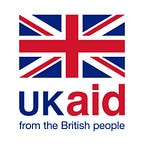Livelihoods in Lebanon
Supporting Syrian refugee women with the International Rescue Committee.
A year ago, 23-year-old Heba was facing a tough future.
As a Syrian refugee in Lebanon, she was finding it difficult to make ends meet. She wanted to go to university, but had lost her education papers when leaving Syria so was trying to find a job instead. But with over 1.4 million Syrian refugees in Lebanon, jobs are hard to find.
But then she met Roushan, another Syrian refugee who works for the International Rescue Committee as an outreach officer. Eight months later, Heba is working in a clothing store in northern Lebanon, thanks to a support scheme run by the IRC, with funding from the UK.
“IRC helped me find this job much faster than if I’d been searching alone”, says Heba.
“They helped me with my CV, and then also helped to connect me to local employers in the area.
“I’ve met new people, have something to do, and can help to support my family. It’s a better life now”, she smiles.
Providing training as well as jobs
A short distance away, an industrial unit clatters to the sound of sewing machines and women talking. It’s more of a classroom than a factory though — an IRC vocational training centre for Syrian refugees.
Maha is one of the Syrian women on the course. She’s learning tailoring as a potential source of income for her family. The classes last for 3 hours and take place 4 days a week for 3 months. As she’s been to more than 80% of the classes, Maha will get to keep a sewing machine and materials to make clothes, once the course has finished.
“I’m really excited to have this opportunity to earn money and support my children”, says Maha.
“Before taking the course, I knew nothing about sewing or tailoring.
“I’ll work 8 or 9 hours a day if possible but what makes me happiest is that I will be able to make clothes for my children, because they are young now and are growing fast!”
Once she’s finished the course, IRC will buy the clothes Maha makes for a further 3 months, and distribute them to other Syrian refugees in Lebanon.
Like many Syrian refugees in Lebanon, Maha is living in an ‘informal tented settlement’. Basically these are informal camps and shelters which are made from scraps of wood and plastic sheeting.
Despite the best efforts of aid agencies and refugees themselves, the shelters are cold and damp. There is little access to running water, sanitation or electricity. They are not nice places to be living. Most families have either a stove or a gas heater, but warm clothes are also vital, so skills like tailoring are in demand.
“We left Syria after my husband was killed 2 years ago”, explains Maha.
“We were so afraid that we couldn’t sleep at night. I feared for my children and my mother, for my brothers and sisters. So we ran away. We left and came to Lebanon.
“There were checkpoints almost every 100 metres along the way. It was terrifying.
“It took us a while to get used to the situation and to live like this.
“I like the tailoring though. I found a corner in the tent for the sewing machine to use it for work.
“The training has provided me with good skills, that I can use to help support my family. It means I won’t need to ask anyone for money”, she smiles.
The vocational training and job-finding schemes run by IRC are both supported by UK aid from the Department for International Development.
The UK has funded £28.6 million towards IRC’s work supporting Syrian people affected by the conflict, inside Syria and neighbouring countries including Lebanon and Jordan. This part of the UK’s overall £800 million response to the humanitarian crisis caused by the conflict in Syria.
UK aid has provided lifesaving water, shelter, medical help and other essential aid to more than a million people in Syria and across the region.
Four years on from the beginning of the conflict, humanitarian aid is saving lives, but only a political solution can resolve the crisis.
To find out more, please visit: www.gov.uk/syria-crisis-aid
To support IRC’s work, please go to: www.rescue-uk.org/syria
Photos and video: Andrew McConnell/Panos for DFID
